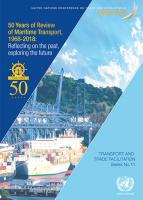
Published for the first time in 1968, the UNCTAD annual Review of Maritime Transport (the Review) is the longest standing UNCTAD flagship report on record. For five decades, the Review has provided wide-ranging maritime transport data and statistics together with critical research and analyses that emphasized the strategic role of maritime transport as an enabler of trade and development.
Fast-forward to 2018, the Review has become a reference for policy makers, researchers, academics, consultants, government agencies, as well as the maritime industry, including ports and shipping. I am pleased to see how this UNCTAD flagship report is now recognized as a ‘must read’ for all those interested in making informed and sound maritime transport policies and keen to understand the role of maritime transport as a trade and sustainable development enabling factor.
Today, developing countries, which have typically been users of international maritime transport services and mainly loading areas for raw materials, are increasingly participating in containerized trade flows and arising as suppliers of maritime transport services, among others, shipbuilding and registration as well as terminal handling operations.
UNCTAD’s Review is unique and unrivaled. It remains the only global publication that annually covers relevant technical and policy aspects of maritime transport, combines both short term and long-term perspectives, supports sound maritime transport policy-making, informs relevant intergovernmental deliberations, while at the same time, bearing in mind the concerns of developing countries. To understand the unique contribution of the Review is to understand UNCTAD’s efforts since the late 1960s to promote a level playing field and respond to developing countries preoccupations over the prevailing shipping market structure, which undermined their ability to participate in global maritime transport services on equal footing with their developed countries’ partners.
This special commemorative issue is timely and auspicious as the 50th anniversary is taking place at the intersection of several developments. The anniversary coincides with the world community committing to achieving a sustainable development path, a climate-friendly world and prosperity for all. It also coincides with early stages of the Fourth Industrial revolution driven by digitalization, with its myriad of challenges and opportunities. It is also taking place at a time of growing trade policy risks that could undermine a multilateral rule-based trading system and dampen the demand for maritime transport, which handles over 80 per cent of world trade volumes. Together, these new realities underscore the imperative for UNCTAD to reflect on how best the Review can continue to report on relevant developments and generate useful insights and requisite data that underpin evidence-based maritime transport policy-making.
I am confident that this Special Issue celebrating the 50th anniversary of the Review will help initiate a collective thinking process and start the debate among all stakeholders and users of this UNCTAD publication, in particular governments, industry and academia, about its future. This reflection will help ascertain ways in which, in an ever-changing world, the Review can continue to effectively respond to developing countries’ needs for a level playing field in maritime transport that also promotes sustainable development objectives.
Secretary General of UNCTAD




